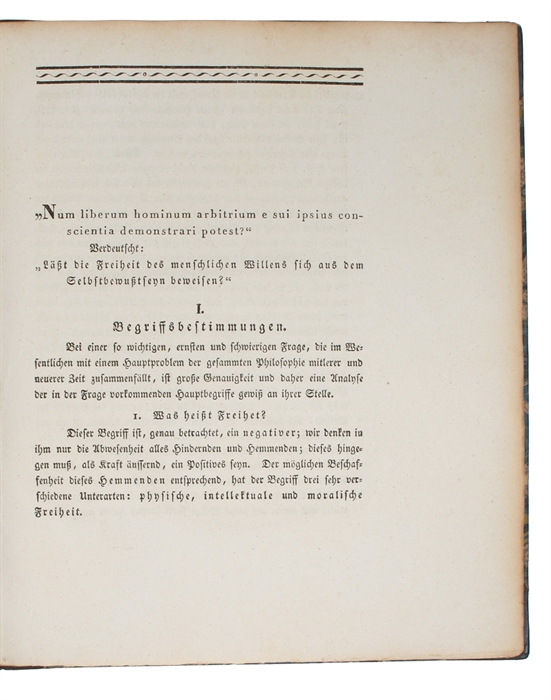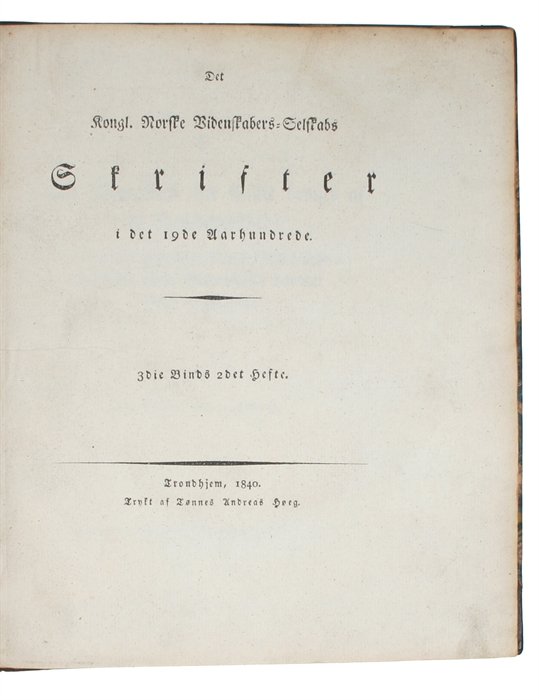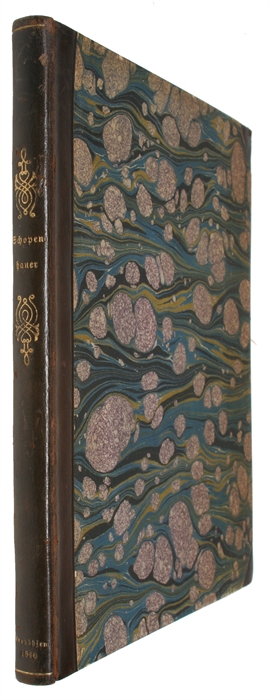SCHOPENHAUER'S FIRST REAL SUCCESS
SCHOPENHAUER, ARTHUR.
"Kan Menneskets frie Villie bevises af dets Selvbevidsthed?" En med det Kongelige Norske Videnskabers=Selskabs større Guldmedaille belønnet Priis=Afhandling. [In: Det Kongl. Norske Videnskabers=Selskabs Skrifter i det 19de Aarhundrede. 3die Binds 2det Hefte]. ["Lässt die Freiheit des menschlichen willens sich aus dem Selbstbewusstsein beweisen?"].
Trondhjem, Tønnes Andreas Høeg, 1840.
4to. Entire volume present. Later very nice brown hcalf w. gilt spine (Anker Kyster). Pp. (1) - 100. Entire volume: (2), 127, (3) pp. With the general title-page for the volume, title-pages and prefaces for the two works contained in the present volume, and the contents-leaf. The other work is: "Den Constitutionelle Statsform, betragtet i dens Forhold til Samfundets høiere Interesser. Tale holden i det Kongl. Norske Videnskabers=Selskab paa hans Majestæt Kongens Fødselsdag den 26de Januae 1838, af Frederik Moltke Bugge, Selskabets Præses."
The scarce first printing of Schopenhauer's "Prize Essay", "On the Freedom of Human Will", which constitutes one of Schopenhauer's greatest successes, one of the works of which he was the most proud, and the work that was awarded the large gold medal from the Royal Norwegian Society of Sciences, being an answer to the proposed question from the Society "Is it possible to demonstrate human free will from self-consciousness?".
The following year, Schopenhauer wrote his "On the Foundations of Morality" ("Über die Grundlage der Moral"), which he sent to the Royal Danish Society of Sciences, but which was not honoured with an award, although it was the only submission to the competition. It is these two works that together constitute his "Two Fundamental Problems of Ethics" ("Die Beiden Grundprobleme der Ethik"), which was published in 1941.
The title-page and the preface are in Norwegian, but the essay itself is in German, "partly because a translation would undoubtedly be superfluous, even unwelcome by anyone who possesses enough scientific education to lead the treatise with interest and knowledge, partly because the copies that would be given to the author would probably lack all interest to him, if they were printed in the Norwegian language, and finally partly because the esoteric nature of the contents seem to make it preferable that the treatise, as far as possible, would not be made accessible to others than those, who due to fairly thorough education are able to avoid misunderstandings as well as being able to properly appraise the value of the treatise, with regards to its reality, in general and partially [own translation - Introduction, pp. (2) - (3).].
Schopenhauer's work is generally accepted as being one of the most brilliant and elegant treatments of free will and determinism. He clearly and elegantly distinguishes between the freedom of acting and the freedom of willing. His conclusion is that human beings do have the freedom of acting, whereas they do not have the freedom of willing, since they are completely determined by the way that their bodies react to outside stimuli and causes.
From the libraries of the two notable collectors Ejnar Christiansen and Esli Dansten.
Order-nr.: 38535




